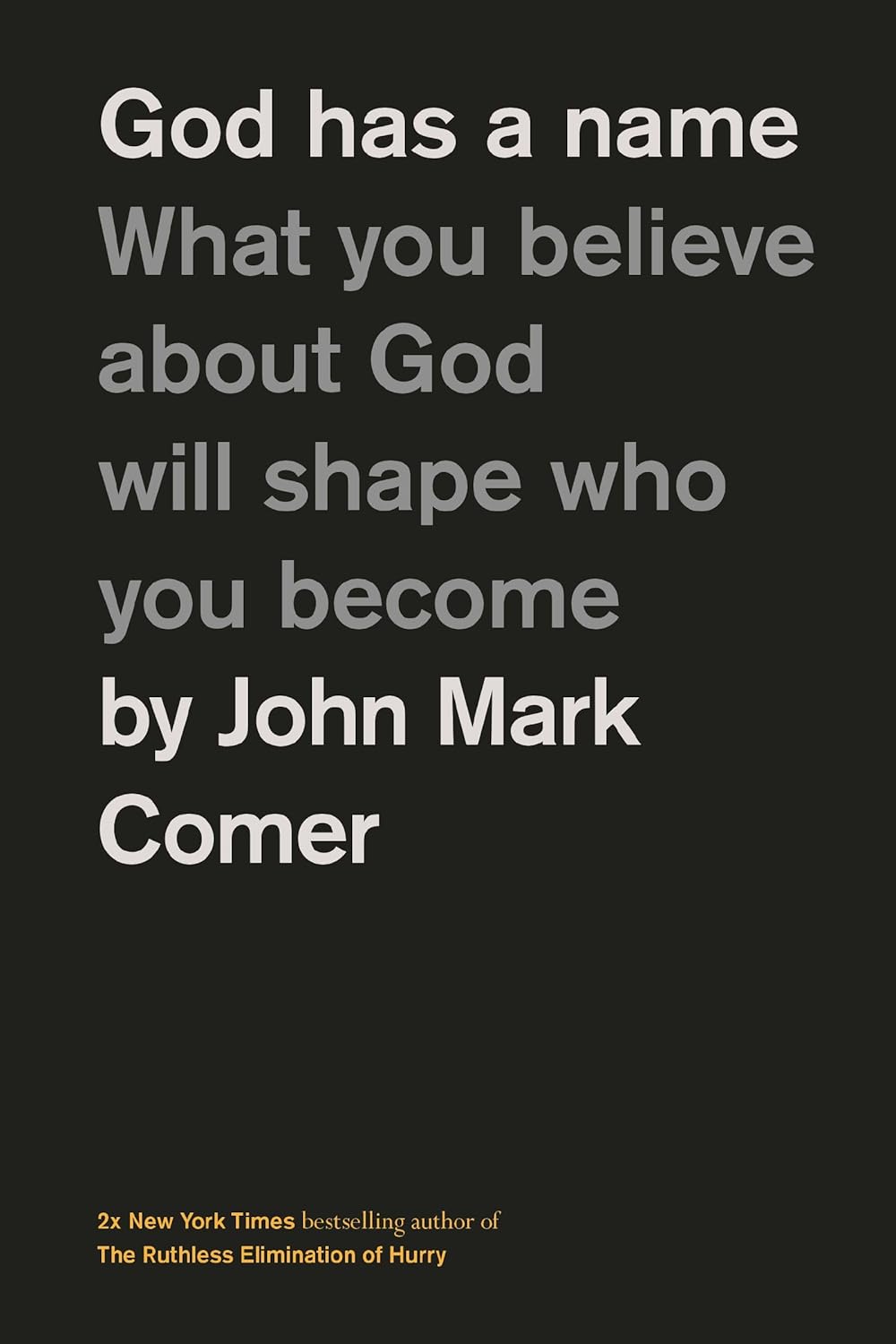Until last year, I hadn’t heard of John Mark Comer. But something has shifted. Everyone now seems to be reading his books, listening to his podcast, or running his branded spiritual formation program at church.
As I remarked to a pastor recently, Comer describes a problem with our churches that rings true: We lack a deeply felt discipleship to Jesus. We need to know God intimately and so be transformed by that knowledge.
Comer agrees. In his book God Has a Name: What You Believe About God Will Shape Who You Become, he argues that our theology directly shapes our character. Yet the particular view of God that Comer outlines misses the mark in important ways.
I’m deeply interested in the book’s thesis because I’m invested in knowing the God of the Bible to be transformed by him. But Comer’s ambiguous relationship to Protestant confessionalism leads him to an incomplete picture of God.

God Has a Name: What You Believe About God Will Shape Who You Become
John Mark Comer
God Has a Name: What You Believe About God Will Shape Who You Become
John Mark Comer
We all live at the mercy of our ideas, and nowhere is this more true than our ideas about God. The problem is many of our ideas about God are wrong. Not all wrong, but wrong enough to form our souls in detrimental and disheartening ways.
John Mark Comer walks line by line through Exodus 34:6-8–Yahweh’s self-revelation on Mount Sinai, one of the most quoted passages in the Bible.
Comer’s One-Dimensional Theology
Once a pastor, Comer is now teacher in residence at Vintage Church LA, which claims an undefined connection to “the worldwide Anglican Communion.” Yet their website doesn’t mention the use of the Book of Common Prayer, Thirty-nine Articles, or other hallmarks of the Anglican tradition, nor do their online offerings seem to point to the use of any of these.
Comer himself writes and teaches without tying himself to any specific tradition. As he says in Practicing the Way, a Jesuit priest functions as his spiritual life director. Thus, it’s no surprise he regularly cites a potpourri of Roman Catholic, Eastern Orthodox, and Protestant or evangelical sources to explain God. Yet he does so without demonstrating a keen understanding of the doctrine of God each of those traditions presents. The result is a doctrine that feels as eclectic as his citations do.
Comer writes that God is One who “can be moved, influenced, who can change his mind at a moment’s notice.” The changeability of God is so important to Comer that he asserts, “He would be less of a God if he couldn’t change his intentions when he wants to, or be open to new ideas from intelligent, creative beings he’s in relationship with” (61).
All Christians will agree that we enter into a relationship with God. And Comer is right to cite biblical passages that appear to show God changing and interacting with us as humans. They’re in the Bible. But he paints a simplistic portrait of a changing deity without citing other biblical passages that speak of God’s unchanging nature and his certain plans for the future. Comer offers a one-dimensional view of God according to Scripture and the selective quotations of theologians who agree with his position.
Scripture’s Multidimensional Theology
As Comer frequently acknowledges in passing, many Christians have shaped their theology by reading the same Bible he has. Yet most Christians have also concluded that God doesn’t “change his mind at a moment’s notice.” They’ve read those passages where God said to his people through his prophets, “I the LORD do not change” (Mal. 3:6) and “God is not man . . . that he should change his mind” (Num. 23:19). Historically, Protestants and Roman Catholics alike have called God’s unchangeable nature his “immutability.” It’s one of the key attributes that differentiates the Creator from his creation.
We shouldn’t be afraid to admit that Scripture’s depiction of God is multidimensional. As Herman Bavinck notes in his Reformed Dogmatics, “At first blush [God’s] immutability seems to have little support in Scripture.” Yet after exploring the biblical evidence for God’s changing, Bavinck concludes, “If God were not immutable, he would not be God.” And, in fact, the Westminster Confession of Faith ties our ability to persevere in salvation to “the free and unchangeable love of God the Father.”
Human love fluctuates, but God’s love isn’t a changing emotion. It isn’t helpful to say, as Comer asserts, that God is “aching for a relationship with you” (50). That’s a partial truth. God does love us. He wants all to come to a saving knowledge of the truth (1 Tim. 2:4). But rather than “aching” for us, he became human to die for us out of his great love. God did so because he’s unchangingly merciful by nature, not because he needs something from his creation (Ex. 34:6–7).
To be true to all of Scripture, we must hold on to the dual truths that we relate to God savingly and yet God remains unchanged and unchanging.
To be true to all of Scripture, we must hold on to the dual truths that we relate to God savingly and yet God remains unchanged and unchanging (see James 1:17). Comer tries to resolve the tension implied in these dual truths by underplaying or ignoring the passages that point to God’s consistency. The result is a deformed understanding of God.
Comer’s Deficient Theology
It’s worth commending Comer’s desire to reach the younger generations as he fills a deep need for a God-centered spirituality. He realizes we need fresh works that bring us to the knowledge of God. Comer is correct that our thoughts about God shape who we are.
But Comer’s detachment from any confessional tradition and his selective presentation of evidence lead to a distinctly modern and Western version of God because it highlights the individual human’s autonomy and power. His theology sounds so much like open theism, a late 20th-century doctrinal error, that he felt it necessary to deny he’s an open theist (288n51).
Comer’s theology is all over the place. He claims to affirm the traditional “omnis,” like God’s omniscience. Yet he also states they’re “totally Western categories, not Hebrew categories.” He justifies ignoring them in God Has a Name because “this is a book about the relational side of God” (282n16). Yet God’s omniscience is central to the way he relates to his creation.
God’s all-knowingness shapes Christians’ character by giving us confidence in the worst circumstances. When a crisis hits, knowing that God plans the end from the beginning (Isa. 46:10) confirms that our travails aren’t meaningless but work together for our ultimate good (Rom. 8:28). Despite our changing fortunes, God remains in control and his love stays with us forever. Comer’s depiction of a changing deity masks the biblical vision of our God who is our sure and steady anchor.
Despite our changing fortunes, God remains in control and his love stays with us forever.
So I agree with Comer’s thesis that we need to know more of God. As Jesus says, “This is eternal life, that they know you, the only true God, and Jesus Christ whom you have sent” (John 17:3). God does have a name. And we must know it. Yet Christians have a rich biblical tradition of theology that explains how, due to the unchanging love of our unchanging God, he took up human nature so he might show us his infinite love.
That’s why, in my view, there’s more benefit in retrieving other evangelical works on knowing God than reading Comer’s attempt at theology. I think of A. W. Tozer’s The Knowledge of the Holy or of J. I. Packer’s Knowing God, both of which, ironically, Comer affirms. More recently, Thaddeus Williams’s Revering God offers a popular-level invitation to orthodox theology. Though well intentioned, God Has a Name minimizes the results of centuries of theological reflection by Spirit-filled believers, which leads Comer to present a distorted view of God’s character out of line with the whole of Scripture.































